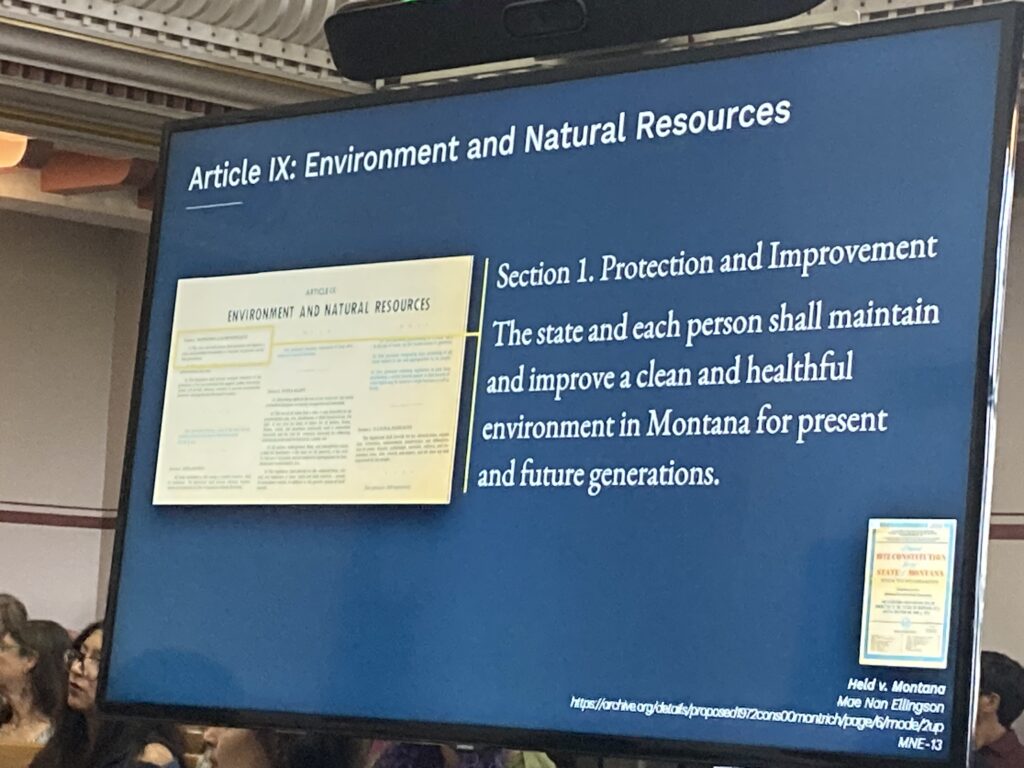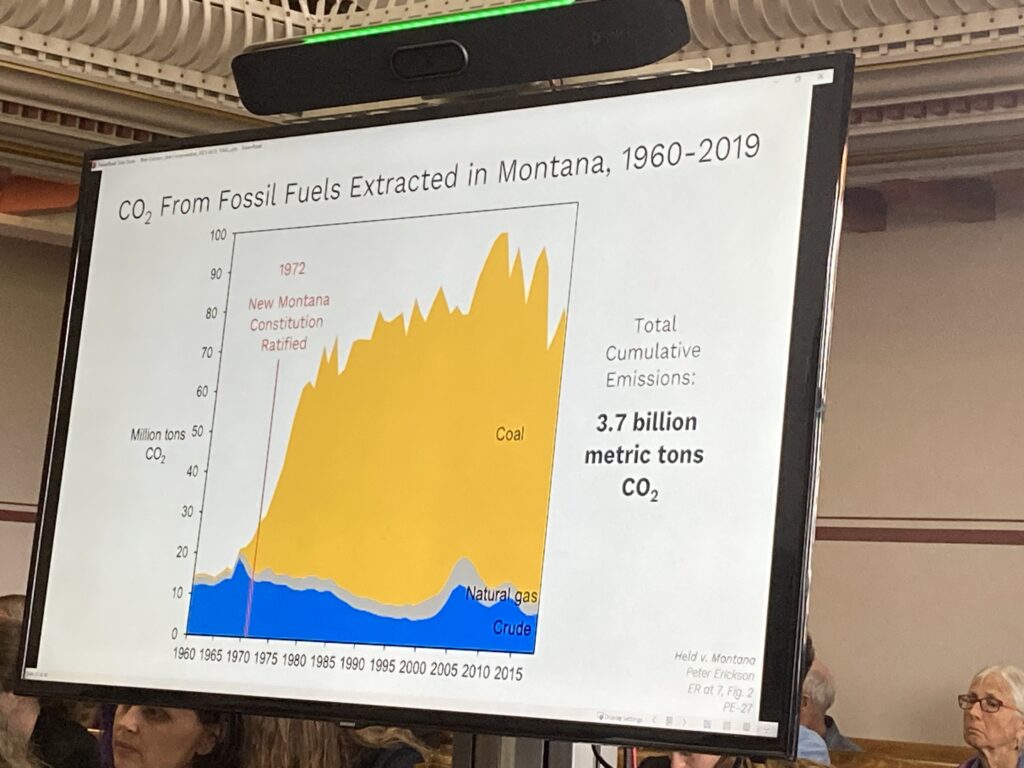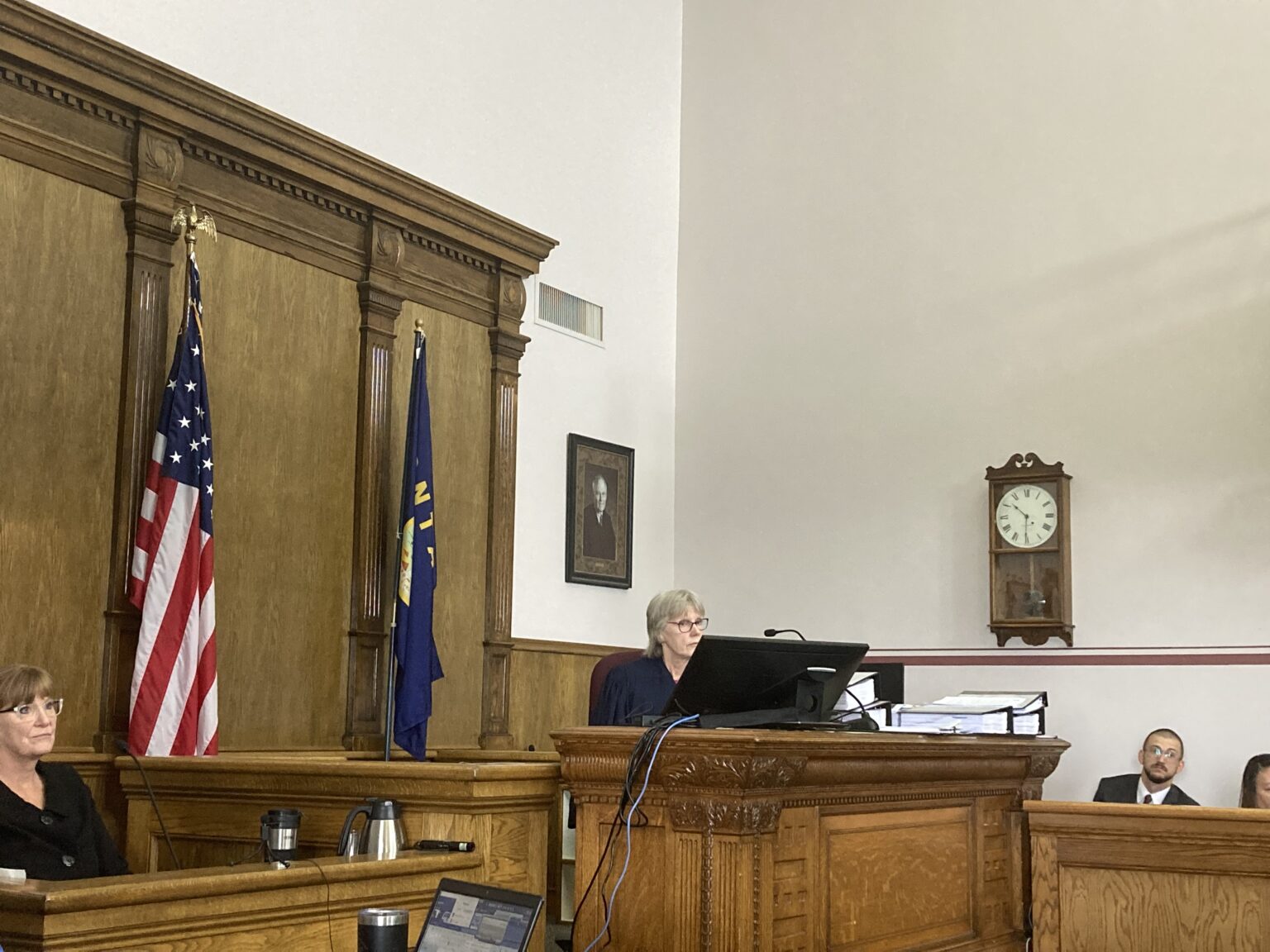Montana “has recognized climate change as a growing concern for decades,” Anne Hedges, director of policy and legislative affairs at the Montana Environmental Information Center, testified to a Montana court on Thursday. Despite this, the state has never denied a permit for any fossil fuel-related project, she said.
“Montana is not walking, it is running, in the wrong direction to address the climate crisis,” Hedges concluded.
Her testimony was part of a landmark youth-led constitutional climate trial currently underway in the state capital of Helena. The case, brought by 16 young Montanans against their state government, contends that Montana is exacerbating dangerous climate change through persistent promotion and permitting of fossil fuels, while simultaneously ignoring the climate impacts of these activities. This conduct runs afoul of Montana’s constitutional right to a clean and healthful environment, plaintiffs say.

This right has existed for more than 50 years. The state adopted a new constitution in 1972 that prioritized environmental protection for present and future generations and guaranteed a clean and healthful environment as an inalienable right. It also explicitly made it the duty of the legislature to enforce this right and to support the “protection of the environmental life support system from degradation.”
But while the climate crisis has deepened and climate scientists warn that governments must urgently move away from fossil fuels, the Montana legislature has been “outright hostile” to the clean energy transition, Hedges said.
In just the past few months, the state’s Republican supermajority swiftly passed a number of bills enabling more fossil fuel development, such as ones that prohibit local governments from taking actions that restrict fossil fuel use or production. The legislature also passed a bill explicitly banning state agencies from even considering climate change and greenhouse gas emissions in environmental reviews of development projects.
Republican Gov. Greg Gianforte signed that bill, HB 971, into law in May. It amends the Montana Environmental Policy Act (MEPA) to state that an environmental review “may not include an evaluation of greenhouse gas emissions and corresponding impacts to the climate in the state or beyond the state’s borders.” Under the previous version of the statute as amended in 2011, the state was barred from considering impacts beyond state borders in environmental reviews. This was implicitly understood to mean that climate change was not allowed to be factored into permitting decisions.
Hedges explained how the 2011 MEPA bill marked a turning point for the state’s treatment of climate impacts in the permitting process. Prior to 2011 the state’s Department of Environmental Quality (DEQ) did evaluate and disclose the greenhouse gas emissions that would result from fossil fuel projects, though the agency did not deny any permits for these projects. But the disclosure offered the public transparent information and opportunity to comment on climate change concerns. Hedges said some projects ultimately were scrapped due in part to public opposition.
This triggered a backlash from the fossil fuel industry, she added, and in the 2011 legislature “the state doubled down on fossil fuels.” It passed the MEPA “climate change exception” bill, which she said the industry “lined up to support.”
Since then, the state continued permitting fossil fuel projects but refused to evaluate any of their climate change impacts. “I have never seen DEQ since 2011 do an analysis under MEPA that includes consideration of climate change,” Hedges testified.
The state has issued permits for a multitude of fossil fuel projects over the past 12 years, particularly for coal mine expansion. Coal is the most carbon-intensive fuel, and while many countries have pledged in recent years to move away from it because of its climate impact, Montana has done the opposite. In 2015, 2019, and 2020 the DEQ permitted projects expanding the Rosebud coal mine, which services the Colstrip coal plant. In 2016, the agency approved the Bull Mountain mine expansion for an additional 176 million tons of coal. DEQ also issued a permit renewal for the Bull Mountain mine just last month. And in 2020, DEQ permitted an expansion of the Spring Creek mine.
Montana has the largest recoverable coal reserves in the United States, accounting for about one-third of the total untapped coal in the country. The state still generates a considerable share of its electricity from coal — it accounted for 42 percent of in-state generation in 2022.

Most recently, Montana regulators approved a fossil gas power plant called the Yellowstone County Generating Station. Montana Environmental Information Center challenged that air permit approval and a judge ruled in April to invalidate the permit based on inadequate consideration of impacts, including climate pollution, under MEPA. That ruling prompted the Republican-controlled legislature to pass the new MEPA law, HB 971, banning climate considerations explicitly. It also passed a bill barring legal challenges based on climate impacts under MEPA from stopping or delaying any permit or authorization.
This clear pattern of defending and enabling fossil fuel activities despite the increasingly dire warnings from climate scientists is why the youth plaintiffs are putting their state government on trial. Their legal claim specifically challenges the state’s policy of prohibiting climate change considerations under MEPA, first established in 2011 and then further clarified with the passage of HB 971 last month.
State senator Mary Ann Dunwell, a Democrat from District 42, which covers eastern Helena, told DeSmog it is clear that a law banning climate change consideration is a violation of Montana’s constitutional guarantee of a clean and healthful environment.
“We’re given legal review notes if our bills are constitutionally non-conforming. So they knew, the Republican majority knew, going into it that this was unconstitutional,” she said.
“Under the Montana constitution, legislators have a job to do, a responsibility. Article 9, Section 1 says we need to work towards a clean and healthful environment,” she added. “Some of my colleagues are breaking that oath that we take. At the beginning of session, we vow to uphold the Montana constitution, and they broke that vow. That’s not ok.”
The youth plaintiffs, who testified to their own lived experiences of climate impacts, like heavy smoke pollution from worsening wildfires, said they feel their government is betraying its constitutional obligation.
“I think the state is showing a blatant disregard for Montanans’ right to a clean and healthful environment,” 20-year-old Taleah Hernández told the court.
“It’s not only written in our constitution… it’s also just about being a decent person,” said fellow plaintiff Sariel Sandoval.
Kian Tanner, an 18-year-old plaintiff, described the physical sensation he feels knowing the state is ignoring climate change in environmental reviews of fossil fuel projects.
“It’s a feeling, a pain, that starts in my back by my shoulder blades and creeps down to the small of my back. It tightens in my core and it makes me feel sick, it makes me feel horrified.”
Subscribe to our newsletter
Stay up to date with DeSmog news and alerts







